Comprehensive Guide to Garden Maintenance in Putney
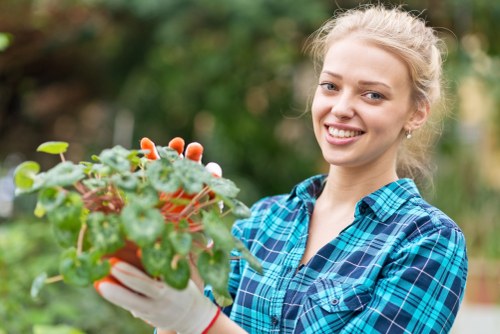
Maintaining a beautiful garden in Putney requires a combination of knowledge, dedication, and the right resources. Whether you're a seasoned gardener or a novice, understanding the unique challenges and opportunities presented by Putney's climate and soil is essential for creating a thriving outdoor space.
Putney, located in the southwest part of London, boasts a temperate climate with mild winters and warm summers. This climate is conducive to a wide variety of plants, but it also necessitates specific maintenance practices to ensure your garden remains healthy and vibrant throughout the year.
In this article, we'll delve into the key aspects of garden maintenance in Putney, covering everything from soil preparation and plant selection to pest management and seasonal tasks. By following these guidelines, you can ensure your garden not only survives but flourishes in Putney's unique environment.
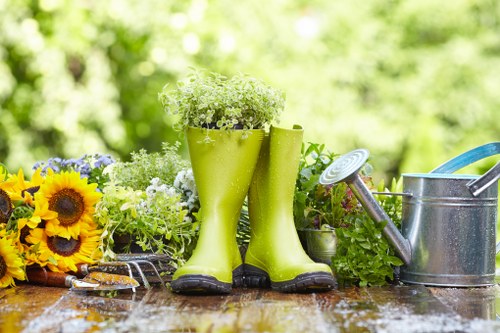
Understanding Putney’s Climate and Soil
Before embarking on any gardening project, it's crucial to comprehend the local climate and soil conditions. Putney's climate, characterized by moderate rainfall and balanced temperatures, supports a diverse range of plant species. However, the soil composition can vary significantly across different areas.
Soil Types in Putney:
- Sandy Soils: Drain well but may require amendments to retain moisture.
- Clay Soils: Retain water effectively but can become compacted and may need improved drainage.
- Loamy Soils: Ideal for most plants, offering a balanced mix of sand, silt, and clay.
Testing your soil is a vital step in determining the appropriate amendments and fertilizers needed to optimize plant health. Local garden centers in Putney often provide soil testing services or can recommend professionals to assist you.
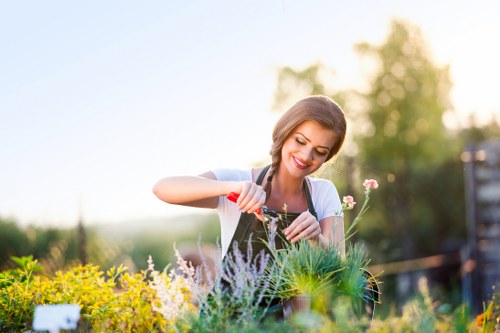
Plant Selection for Putney Gardens
Choosing the right plants is fundamental to successful garden maintenance. In Putney, it's important to select species that are well-suited to the local climate and soil conditions. Here are some popular choices:
Perennials
Perennials return year after year, providing consistent beauty with minimal replanting. Consider plants like lavender, echinacea, and hostas, which thrive in Putney's climate.
Annuals
Annuals offer vibrant colors and can fill gaps in your garden. Petunias, marigolds, and zinnias are excellent choices for seasonal blooms.
Shrubs and Trees
Incorporating shrubs and trees adds structure and height to your garden. Popular options include hydrangeas, boxwoods, and ornamental fruit trees.
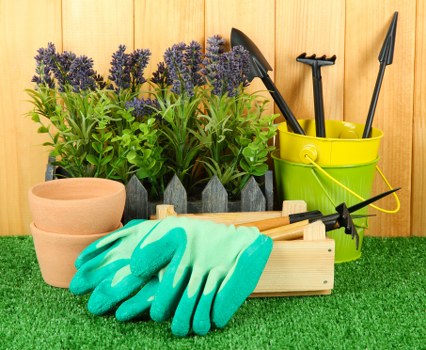
Essential Garden Maintenance Tasks
Regular maintenance is key to a healthy garden. Here are the essential tasks to keep your Putney garden in top condition:
Watering
Proper watering ensures your plants receive the moisture they need. It's best to water early in the morning to reduce evaporation and prevent disease.
Weeding
Weeds compete with your plants for nutrients and water. Regularly removing weeds helps maintain plant health and garden aesthetics.
Pruning and Trimming
Pruning promotes healthy growth and removes dead or diseased branches. Trim shrubs and trees during the appropriate seasons to encourage robust development.
Fertilizing
Fertilizing provides essential nutrients to your plants. Use organic fertilizers to enrich the soil without causing harm to the environment.
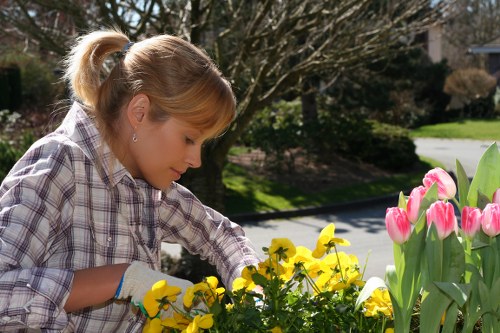
Pest and Disease Management
Protecting your garden from pests and diseases is crucial for maintaining plant health. Integrated Pest Management (IPM) strategies can help mitigate these issues effectively.
Common Pests in Putney
- Aphids
- Slugs and Snails
- Japanese Beetles
- Spider Mites
To control pests, consider natural predators like ladybugs and using organic pesticides when necessary. Regularly inspect your plants for signs of infestation.
Disease Prevention
Prevent diseases by ensuring proper air circulation, avoiding overwatering, and selecting disease-resistant plant varieties. Promptly remove any infected plants to prevent the spread of pathogens.
Organic Solutions
Opt for organic methods such as neem oil or insecticidal soap to manage pests without harming beneficial insects or the environment.

Seasonal Garden Care
Different seasons bring unique challenges and requirements for garden maintenance. Adapting your care routine to the changing seasons ensures year-round garden health.
Spring
- Start planting early spring vegetables and annuals.
- Prune deciduous trees and shrubs before new growth begins.
- Apply mulch to conserve moisture and suppress weeds.
Summer
During the summer months, focus on regular watering, deadheading spent blooms, and monitoring for pests.
Autumn
Prepare your garden for winter by clearing fallen leaves, planting spring bulbs, and protecting sensitive plants from frost.
Winter
While plants may enter a dormant phase, winter garden maintenance includes pruning, planning for the next season, and maintaining garden tools.

Tools and Equipment for Efficient Garden Maintenance
Having the right tools can significantly enhance your garden maintenance efforts. Here are essential tools for any Putney gardener:
- Pruning Shears
- Garden Fork
- Watering Can or Hose
- Wheelbarrow
- Gloves
Investing in high-quality tools ensures durability and efficiency, making your garden tasks easier and more enjoyable.
Organic Gardening Tools
For eco-friendly gardening, choose tools made from sustainable materials and consider composting to reduce waste. Organic gardening practices promote a healthier ecosystem in your garden.
Tool Maintenance
Regularly clean and sharpen your tools to extend their lifespan and maintain their effectiveness. Proper maintenance prevents rust and ensures precise cuts when pruning.

Hiring Professional Garden Maintenance Services
While DIY gardening can be rewarding, there are instances where hiring professional garden maintenance services in Putney can be beneficial. Professionals bring expertise, efficiency, and access to specialized equipment.
Benefits of Professional Services
- Expert Knowledge of Local Plant Species
- Efficient Time Management
- Access to Advanced Tools and Equipment
- Consistent Maintenance Schedules
Professionals can handle complex tasks such as landscape design, tree surgery, and pest control, allowing you to enjoy your garden without the hassle of maintenance.
Choosing the Right Service Provider
When selecting a garden maintenance service in Putney, consider factors such as experience, reputation, range of services offered, and pricing. Reading reviews and seeking recommendations can help you make an informed decision.
Customized Maintenance Plans
Opt for service providers who offer tailored maintenance plans to meet the specific needs of your garden. Customized plans ensure that all aspects of your garden are addressed effectively.

Eco-Friendly Practices for Sustainable Gardening
Embracing eco-friendly gardening practices contributes to environmental sustainability and promotes a healthier garden ecosystem. Here are some strategies to consider:
Composting
Composting organic waste reduces landfill usage and provides rich nutrients for your garden. Create a compost bin and regularly add kitchen scraps, leaves, and grass clippings.
Rainwater Harvesting
Collecting rainwater for garden use conserves water and reduces utility bills. Install rain barrels to capture and store rainwater during the wetter months.
Native Plants
Planting native species supports local wildlife and requires less maintenance. Native plants are well-adapted to Putney's climate and soil conditions, making them more resilient.
Natural Pest Control
Use natural pest repellents and attract beneficial insects to manage pest populations without harming the environment. Companion planting is an effective method for deterring pests naturally.

Maximizing Garden Aesthetics
Aesthetics play a significant role in garden maintenance. A visually appealing garden enhances the overall ambiance of your outdoor space. Here are some tips to maximize garden aesthetics in Putney:
Plant Arrangement
Arrange plants based on their height, color, and blooming seasons to create a harmonious and balanced look. Grouping plants with similar needs can also simplify maintenance.
Pathways and Borders
Incorporate pathways and borders to define different areas of your garden. Materials like gravel, stone, or wood can add texture and interest.
Lighting
Strategic garden lighting highlights key features and extends the usability of your garden into the evening. Solar-powered lights are an eco-friendly option.
Water Features
Adding a fountain, pond, or birdbath can serve as a focal point and attract wildlife, enhancing the garden's natural beauty.

Seasonal Planting Schedules
Adhering to a seasonal planting schedule ensures that your garden remains vibrant and productive throughout the year. Here’s a breakdown of planting activities for each season in Putney:
Spring Planting
- Start sowing seeds for vegetables like lettuce, peas, and carrots.
- Plant hardy annuals and perennials.
- Divide and transplant perennials to promote growth.
Summer Planting
Focus on maintaining existing plants and planting heat-tolerant species. Ensure consistent watering during dry spells.
Autumn Planting
- Plant bulbs for spring blooms such as tulips and daffodils.
- Establish new shrubs and trees.
- Prepare garden beds for winter by adding mulch.
Winter Planting
While winter is not typically a planting season, you can plan and prepare for the next year by reviewing your garden layout and selecting new plant varieties.

Integrating Technology in Garden Maintenance
Modern technology offers innovative solutions to enhance garden maintenance. Utilizing these tools can improve efficiency and effectiveness in managing your Putney garden.
Smart Irrigation Systems
Smart irrigation systems automate watering based on weather conditions and soil moisture levels, ensuring optimal water usage and reducing waste.
Garden Management Apps
Apps like Gardenize and Planter help you organize planting schedules, track growth, and manage maintenance tasks, making garden management more streamlined.
Automated Tools
Robotic lawn mowers and automated feeders can handle routine tasks, freeing up your time for more creative aspects of gardening.
Data-Driven Gardening
Using data from weather forecasts and soil sensors can inform your gardening decisions, allowing for timely interventions and adjustments to care routines.

Creating a Wildlife-Friendly Garden
A wildlife-friendly garden supports local biodiversity and creates a vibrant ecosystem. By incorporating elements that attract beneficial wildlife, your Putney garden can become a haven for various species.
Attracting Pollinators
- Plant nectar-rich flowers like bee balm and coneflowers.
- Provide habitats such as bee hotels and butterfly puddling stations.
Supporting Birds
Install bird feeders, birdhouses, and water sources to attract a variety of bird species. Planting berry-producing shrubs also provides natural food sources.
Encouraging Beneficial Insects
Beneficial insects like ladybugs and lacewings help control pest populations naturally. Planting a diverse range of species ensures a steady food supply for these helpful creatures.
Creating Shelter
Provide shelter through dense plantings, rock piles, and ground covers. These features offer protection and nesting sites for various wildlife.

Sustainable Garden Practices
Sustainability in gardening ensures that your maintenance practices are environmentally responsible and resource-efficient. Implementing sustainable practices benefits both your garden and the broader ecosystem.
Reducing Waste
- Compost organic waste instead of disposing of it.
- Reuse and recycle materials for garden projects.
Water Conservation
Implement water-saving techniques such as mulching, drip irrigation, and rainwater harvesting to minimize water usage.
Energy-Efficient Tools
Choose energy-efficient gardening tools and equipment to reduce your carbon footprint. Solar-powered lights and electric tools are excellent alternatives to their gas-powered counterparts.
Soil Health
Maintain healthy soil through regular organic matter additions, cover cropping, and crop rotation. Healthy soil leads to more resilient plants and reduces the need for chemical fertilizers.

Conclusion: Achieving a Thriving Putney Garden
Garden maintenance in Putney is a rewarding endeavor that combines beauty, functionality, and sustainability. By understanding the local climate and soil, selecting appropriate plants, and adhering to regular maintenance practices, you can cultivate a garden that thrives year-round.
Whether you choose to maintain your garden yourself or enlist the help of professional services, the key is consistency and a willingness to adapt to the changing seasons and conditions. Embrace eco-friendly practices and integrate technology to enhance your gardening experience and contribute positively to the environment.
Ready to transform your outdoor space? Contact us today to book your garden maintenance service in Putney and enjoy a lush, vibrant garden all year round.